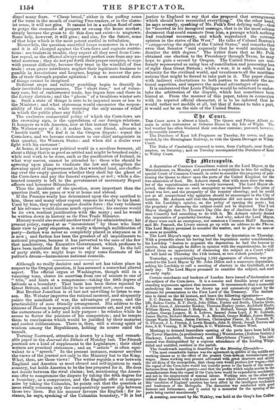Although no really decisive and novel act has taken place
in respect to the Oregon question, it has assumed a somewhat altered aspect. The official organ at Washington, though still in a vaunting tone, abates its assertion from one of seizure to one of "title," and hints at a compromise—taking the 49th degree of latitude as a boundary. That basis has been thrice rejected by Great Britain, and is not likely to be accepted now, mero motu. But Brother Jonathan is at last not unwilling to listen to rea- son. Mr. Webster improves the rational moment, and eloquently paints the mischiefs of war, the advantages of peace, and the practicability of some friendly arrangement. His address to the citizens of Boston is managed with consummate art, and yet with the earnestness of a lofty and holy purpose : he rebukes while he seems to flatter the passions of his compatriots ; and he tempts them to conclusions which would be justified by their matureot and coolest deliberations. There is, then, still a strong spirit of wisdom among the Republicans, holding its course amid the tumult.
Turning Eastward, attention is drawn by a long and remark- able paper in the Journal des Debats of Monday last. The French journals are a kind of supplement to the Legislature ; their chief writers are practical statesmen ; and an "article" is often equi- valent to a "speech." In the present instance, rumour ascribes the views of the journal not only to the Ministry but to the King. What, then, are those views? The writer regards a war between England and America as most absurd and self-injurious to each country, but holds America to be the less prepared for it. He does not decide between the rival claims; but, mentioning the Ameri- can offer to compromise the dispute by taking the 49th degree for a boundary, as a compromise, and the English offer at compro- mise by taking the Columbia, he points out that the question at issue really concerns only the comparatively narrow slip between those two lines. But his manner favours the English : for in- stance, he says, speaking of the Columbia boundary, "It is but
justice to England to say that she proposed that arrangement which should have reconciled everything." On the other hand, he says severely, speaking of Mr. Polk's first defying sally—that he "inserted in his inaugural message, that is in the most solemn document that could emanate from him, a passage which notthjng. had rendered necessary, and which reproduced the extreme opinion in the states of the West." He talks of Colonel Benton's " exaggerating the rights of the United States," and remarks that even that Senator "said expressly that he would maintain for frontier the 49th degree." The writer fears that as Mr. Polk obtained one election to the Presidency through Texas, he may hope to gain a second by Oregon. The United States are uni- formly represented as using less of conciliation and possessing lees of right than Great Britain ; while a war, it is said, would be a calamity for the civilized world, and vexatious to all the maritime nations that might be forced to take part in it. The paper closes with indirect exhortations to both parties to moderate the na- tional asperities, and improve the mutual advantages of peace. It is understood that Louis Philippe would be reluctant to under- take the arbitration of the dispute, which has sometimes been hinted at. From the manner of this paper, taken in connexion with its reputed official character, it is to be inferred that he would rather not meddle at all, but that if forced to take a part, it would not be on the side of the United States.


























 Previous page
Previous page